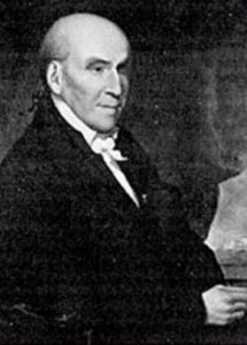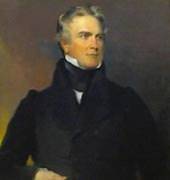Related Topics
Investing, Philadelphia Style
Land ownership once was the only practical form of savings, until banking matured in the mid-19th century. Philadelphia took an early lead in what is now called investment and still defines a certain style of it.
City of Rivers and Rivulets
Philadelphia has always been defined by the waters that surround it.
Finances of the Girard Estate

|
| Stephen Girard |
Stephen Girard died on December 26, 1831. It required 7 years for executors to settle the estate of this richest man in America, valued at $7 million, of which $5.25 million was to establish a school for poor white orphan boys. Two million dollars of that was set aside in the will for the construction of his new school. Considerable criticism was raised about the fact that the various administrators of his estate did not admit a single student for the first sixteen years, during which time extensive trustee tours of Europe were conducted to study suitable models and publish books about them. At the end of that time of preparation, the two million dollars were just about all gone. It turns out that Girard could actually afford this luxurious approach. In 1886 the estate would rise in value to $11 million, in 1914 it was worth $30 million. In 1926 it was worth $73 million. This appreciation was in spite of educating more than 10,000 boys, and also purchasing and repaving (with Belgian blocks) both Delaware Avenue and Water Street, from Vine to South Street as a public service to which more than $2 million was devoted. In 1935 Cheesman Herrick wrote a history of Girard College, in which is found the following, rather delicate, history of the long-term financial management by the Board: "The Board of Directors of City Trusts is a creation of the State of Pennsylvania. At the outset in the administration of the Girard will, the city authorities looked to the state Legislature for an empowering act to proceed with the organization of Girard College. The same authority [then] set aside the control of the City councils and put the Girard Estates and Girard College under a new Board which became a part of the machinery of the city government. Probably no more successful administration of public trusts has ever been known than that by the Board of Directors of City Trusts. Time has known the wisdom of Stephen Girard in leaving the administration of his estate as he did. "Colonel Alexander K. McClure, who knew Philadelphia well and who was relentless in his inquiry as to the discharge of trusts by public officials, paid the Board of Directors of City Trusts a deserved compliment in saying that no shadow of doubt or suspicion had ever fallen upon the doing of that body. It may be added further that probably no other government agency or private business enjoys a higher reputation for integrity and efficiency in the conduct of its affairs that does this Board. That this record is good is owing primarily to the standard set by those who have served under the Board in various business and administrative positions.
"When the record of the Board is taken into consideration, and the magnitude of the work which it has to supervise is regarded, one can readily see that service on this Board is a signal distinction. The list of the Board has been a sort of honor roll of Philadelphia's foremost citizens. That the standard in this Board has been so high and that members of the Board have served so faithfully, have been due in no small part to its members' having seen beyond the millions of Stephen Girard, and numerous other funds which they have handled, to the great good which these various trusts are accomplishing. With the interest of the beneficiaries always in mind the Board has conscientiously sought to make the Girard Estate, and the other foundations under its supervision, serve the community to the greatest possible extent. The idea of service has been the touchstone making the Board of Directors of the City of Trusts a great Board." Starting with Nicholas Biddle, the Board of the institution was certainly composed of men who had distinguished themselves in business and finance. However, a great deal of credit must be given to Stephen Girard, himself. A year before he died, he bought roughly 18,000 acres of Schuylkill County after the discovery of coal outcroppings on the property. In subsequent years over a hundred million dollars of anthracite coal were extracted by the mining agents of the Girard Estate, based in Pottsville, PA. The clean-burning properties of this form of coal were promoted with the image of "Phoebe Snow", and were the basis for much of the industrialization of the region. Coal came down the Schuylkill River on canal barges with a terminus opposite the present boathouses, hence the Lighthouse adorning Sedgwick, the most northern boathouse. Later, it was carried on the Reading Railroad, which at one time was the largest railroad in the nation. The Girard heirs felt this went far beyond Girard's contemplated income from the estate, and went to court to obtain for themselves what they considered a more appropriate share of it. Their argument boiled down to saying Girard College had so much money it didn't know what to do with it and was returning income to principal. It was their contention that if Girard could have predicted both the revenue and the expenses of the school, he would have left the school less money, and given more to his numerous heirs. The managers of the estate, who felt their own acumen was largely responsible for the windfall, made a sophisticated and ultimately successful rebuttal. Instead of relying on the contrast between the incredibly good performance of the Board of City Trusts, compared with the earlier looting of the estate by City Council, their lawyer

|
| Horace Binney |
(Horace Binney) relied on and largely invented some important legal reasoning. Coal in the ground was a dwindling asset, and speed of its dwindling was under the control of the owners. The managers of Girard's estate had shrewdly transformed the coal into a more conventional source of income by taking proceeds at the best available price, regardless of the needs of the school. With it, they put up office buildings and department stores in the center of Philadelphia on the land around 12th and Market, first intended to be the site of the orphan school. Also, the six hundred acres of Girard's farm in South Philadelphia were converted to rental houses. In time, the income from the coal-bearing properties was transferred to center-city rentals -- all within the bounds of real estate which Girard had purchased before his death. The trustees had enhanced the value of Girard's properties by shifting assets amongst them, a result that greatly benefited the entire city and region, and rendered the entire concept of annual income -- irrelevant. The legalisms of this dispute are very clever, but in truth, the Girard's heirs probably never had a chance in court against the political and business establishment of the whole state, united in the firm belief they were doing a remarkably benevolent thing for orphans. It is breath-taking to reflect that Girard College's anthracite did become the economic pump for the entire Philadelphia industrial region from Pottsville to Trenton, for nearly a century. And equally breathtaking to reflect that, about a century later, anthracite mining just about ceased entirely. Although there was shrewd later management of the assets, the fact is the coal was discovered, purchased and bound up in irrevocable covenants by a single man in 1829, who was therefore dead during every day of this activity, except during the first year when the plan was organized. If he wanted to do this for orphans, it is scarcely possible even to suggest a reason why he shouldn't.
REFERENCES
| Girard College It's Semi Centennial of Girard College: George P. Rupp ASIN: B000TNER1G | Amazon |
Originally published: Tuesday, June 20, 2006; most-recently modified: Monday, May 20, 2019
| Posted by: Linda Nalepa | Aug 20, 2007 7:44 PM |
| Posted by: deb cambria | May 9, 2007 9:08 PM |